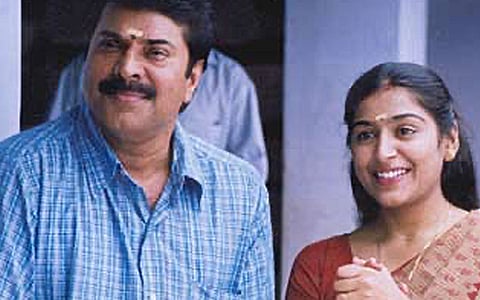
- Reviews
- Power List 2024
- Cannes 2024
- In-Depth Stories
- Web Stories
- News
- FC Lists
- Interviews
- Features
- FC SpecialsFC Specials

My introduction to the genius of Mammootty was unconventional, in a sense, as it was in a Tamil film (Kandukondein Kandukondein), where he plays one of four leads. Still, his sensitive performance encouraged me to venture further into his filmography, and a friend recommended Kaazhcha, a movie about Mammootty inadvertently becoming a parent figure to a lost child.
Becoming a reluctant parent is a fairly common trope (Bajrangi Bhaijaan, The Mandalorian), but what sets this film apart is Mammootty's performance – subtle, yet clear in its exploration of his character's conflict. In a film that revolves around a character forming a bond with child they are unable to communicate with, body language is everything. As a film projectionist who continues to be enamoured by the art form, our introduction to Mammootty's character "Madhavan" is of him watching a film he is screening, with a look of awe on his face – reminiscent of the iconic shot of a young Salvatore looking through a film reel in Giuseppe Tornatore's Cinema Paradiso. This is the first of many scenes where we dive into his character's psyche with no actual dialogue. In the earlier half of the movie, which has a lighter tone, his character's shyness and embarrassment from being offered adult films by his regular distributor, and his tactic of sneezing to avoid paying his house help are played for humour, the latter almost seeming like a nod to his performance style throughout the movie where the gestures do the talking.
Throughout the film, his character's demeanour – right from his gentle speaking tone to his posture – exudes care and concern, which is perhaps why Pavan, a displaced, non-Malayalam-speaking child gravitates towards and trusts Madhavan, and vice versa. As his bond with Pavan develops into a full-fledged parent role, Madhavan's inner conflict becomes more apparent. While his wife is forthcoming in her sadness at eventually having to let Pavan go, Madhavan overtly reiterates that Pavan going back to his family is for the best. But the audience knows he shares his wife's sentiments, as Mammootty non-verbally indicates Madhavan's hesitation in every interaction he has with Pavan, which is laced with a sense of sorrow about the inevitable. This emotion crescendos in the moment he learns where Pavan is from, his face indicates a combination of shock and fear, but we aren't sure what about: Is he worried Pavan's parents have passed away? Is he worried Pavan must go back home? The events that follow pay testament to Mammootty's effectiveness as an actor, as we learn that Madhavan doesn't know either.
His hesitation becomes more evident in conversations with his wife, and despite political hurdles, he is unrelenting in his resolve to do what he believes is best for the child. But the evolution of his bond with Pavan, which mirrors Pavan's evolved proficiency in Malayalam from his first interaction with Madhavan, eventually betrays his resolve and Madhavan, now evidently desperate, begs the authorities to let him raise Pavan as his own, since his parents are missing. This culminates in an incredibly moving scene which the audience experiences through the heart-breaking duality in emotions Mammootty expresses as Madhavan hugs Pavan and walks away as the sun sets – he knows he will likely never see Pavan again, but he lives on in the hope of a reunion.